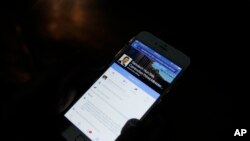Increasing government online surveillance and targeting of free speech on social media saw Cambodia’s record of protecting internet freedoms follow a downward trend, as seen across Southeast Asia, according to watchdog and think tank Freedom House.
The annual “Freedom on the Net 2019” report released by Freedom House on Nov. 12 showed Cambodia drop two points in its online freedoms rating, notching a “partly free” classification. This meant Cambodia did better than its Asean neighbors, Thailand and Vietnam, but only by a little.
The major reasons for the drop in score was the blocking of independent news websites during the controversial 2018 national election, persecution of social media users for online activity and the prosecution of people based on the lèse-majesté amendments added to the criminal code in 2018.
“Internet freedom in Cambodia actually declined, and this was because we saw increased website blocks around the July 2018 general election by the government,” Allie Funk, a research analyst for at Freedom House.
The Cambodian government used a range of different tactics to control the online environment, Allie Funk noted, including requesting online content removal and the use of criminal law to silence dissent.
Cambodia has seen a significant increase in internet and mobile users, more than 14 million users online, driven by largely affordable data plans and a wide array of cheap smartphones available in the market. Social media usage has increased, with Facebook use becoming almost synonymous with the internet in Cambodia.
The Freedom House report shows Cambodia underperformed on the violation of internet users’ rights, especially on the failure of laws to protect freedom of expression, the requiring of internet service providers to aid the government in monitoring users and the penalizing of online activity, including prison sentences for insulting the King.
Following the addition of the lèse-majesté provision to the constitution, there have been at least eight cases related to the controversial article that have been brought before courts, some of which have resulted in convictions and prison terms, said Chak Sopheap, director of Cambodian Center for Human Rights.
“This is one of the tactics the government uses to restrict online activities and threaten [online users], and it negatively affects citizen’s freedom of expression, which would lead to increasing self-censorship online,” she told VOA Khmer from Phnom Penh.
Chak Sopheap said the downward trajectory of online freedoms was mirroring the overall deterioration of democratic values and human rights protections in the country, which was the result of a crackdown orchestrated by the Cambodian government against the political opposition, civil society and independent news organizations.
“It’s critical that the government reverses its course from the [current] crackdowns to restoring human rights, so that people can benefit from exercising their right to free expression, be it online or offline,” Chak Sopheap said.
Nop Vy, media director for the Cambodia Center for Independent Media, said the government seemed emboldened to use these laws frequently, especially against any dissent and criticism of the executive, which has been led by Prime Minister Hun Sen for more than three decades.
“I think the government has a tendency to control online space, especially social media users, rather than ensuring that people can fully express themselves for the sake of public interest,” Nop Vy said.
Relative to its neighbors, Nop Vy points out that Cambodia’s internet freedom was better than that of Vietnam and Thailand. Freedom House ranked the two countries as “not free.”
Thailand has faced criticism for the use of its own lèse-majesté provisions and the former military junta government’s crackdowns on free expression. Vietnam has jailed activists and bloggers for critiquing the government, and has been criticized for a cybersecurity law that requires local storage of online data and for it to be handed over to the authorities without the need for a warrant.
“This is a really worrisome trend just across the region. Looking just around Cambodia, Thailand and Bangladesh have been doing this increasingly – blocking websites and removing content,” said Freedom House’s Allie Funk.
She added that countries in the region seemed to be learning from each other, adopting practices and legislation in their own countries.
Daniel Bastard, director of the Asia Pacific region for Reporters Without Border, said that Thailand and Singapore, with the track record of restricting online freedoms, were seemingly influencing Cambodia’s policies towards online dissent.
“The Cambodian government somehow gets inspiration from both of these counter-models,” he said.
Daniel Bastard believed China, the world’s leading model of online surveillance and censorship, and U.S. President Donald Trump’s constant attacks against the media had a role to play in increasing authoritarian outlooks towards online freedoms.
“China is trying to impose its model of information control and censorship all over the world. And clearly, Donald Trump, whose overt and explicit despise against journalists, press freedom and human rights in general, has devastating effects on the whole world as well,” he said.








